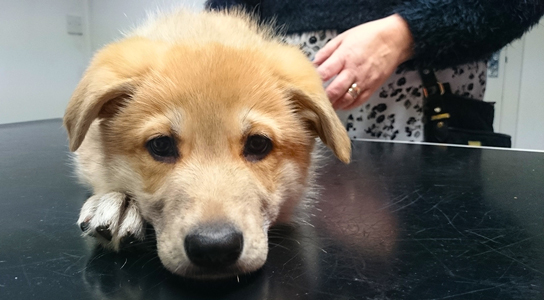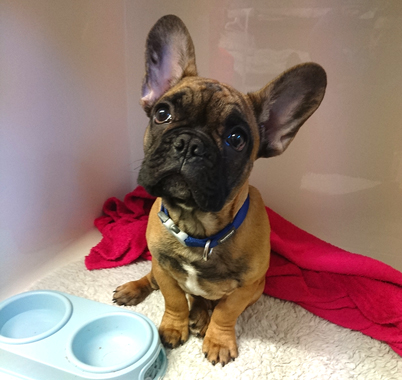
We all know that having a dog in your life is beneficial, so at Westport Veterinary Clinic we want to keep your dog happy and healthy for as long as possible. Our experienced team can help with young pups to golden oldies and everything in between!
Below we have put together some advice about your dogs health and a summary in a handout format (Please click here to download PDF) but remember if you are concerned at all about your pooch please contact us at your local branch.
Prevention
Vaccinations
Dog vaccinations not only give protection for your dog but also peace of mind for you. Your dog will be protected against several diseases which are often fatal and this will also prevent diseases being passed on.
Your dog should receive primary vaccinations early in life, from 6 weeks and again a couple of weeks later, followed by boosters, usually once a year, for the rest of its life.
We routinely vaccinate against Canine Distemper, Parvovirus, infectious canine hepatitis, kennel cough, Adenovirus, Parainfluenza and Leptospirosis. This vaccination schedule should keep your dog fully protected and most kennels insist upon full protection before any dog is admitted.
A pet in poor health will not respond reliably to vaccination so we make sure that every dog is given a full clinical examination as part of their vaccination appointment.
Neutering
Neutering is an operation where in male animals, the testicles are removed – this is called ‘castration’ and in female animals, the ovaries and the uterus (womb) are removed – this is called ‘spaying’. There are hundreds of thousands of unwanted animals in need of homes. Neutering stops animals from adding to this problem by preventing unwanted litters. Neutering can help your dog to live longer and enjoy a better quality of life and reduces the risk of pets developing some serious diseases.
Parasites (worms, fleas, ticks, lice and mites)
Regular treatments stop your dog suffering from worms, fleas and other parasites. It’s important to choose the treatment from your vet who will recommend the most appropriate but also because these treatments have been clinically proven to be safer and more effective than ‘over the counter’ versions bought at pet shops and supermarkets.
Fleas cause itching, chewing and licking and the skin may appear red and inflamed. If you notice any of these signs please make an appointment to see one of our experienced vets. If your dog has fleas it is essential that you not only treat your dog but also your home and other pets.
We recommend that all puppies are wormed every month until they are 6 months old. Dogs from the age of 6 months should then be wormed every 3 months throughout their life.
Microchipping
From April 2016 all dogs in Scotland, England, Wales and N Ireland must be microchipped by law. If a dog is stolen or lost a microchip might provide the only means to contact the owner. This involves a tiny electronic chip being placed under the skin between the shoulder blades. The chip is read by a special scanner and it means that your pet is permanently identified.

Everyday Concerns
Chocolate Poisoning
Chocolate contains the chemical theobromine, a chemical similar to caffeine. This can affect your dog’s heart, kidneys and nervous system.
The signs of chocolate poisoning include any combination of the following; Vomiting, diarrhoea, incoordination, restlessness and hyperactivity, rapid breathing, rapid heart rate and seizures.
Our advice is never to offer chocolate to your dog. If you suspect your dog has eaten chocolate it can be difficult to know how much they have ingested. It is always best to err on the side of caution as very small amounts of chocolate can cause toxicity in dogs so please call us at the surgery as soon as possible. There is no antidote to theobromine. In most cases your dog will be made to vomit in order to prevent further absorption of theobromine from the stomach.Inducing vomiting can still be effective more than 6 hours after chocolate ingestion. If your dog is already showing signs of chocolate poisoning he/she may also be placed on an IV fluid drip and treated according to the symptoms e.g. for seizures or heart irregularities.
Prevention is always better than cure so please keep chocolate away from curious paws and noses.
Obesity
Over the past years obesity has become more common in UK pets. Just as we hear about in people, we are also facing an “obesity epidemic” in our dogs and cats.
There are many health risks associated with dogs and cat that are overweight. Obesity has been proven to reduce life expectancy and decrease quality of life. Animals that are overweight are more prone to diabetes, urinary tract disease, pancreatitis and osteoarthritis/lameness, as well as increasing the risks associated with anaesthesia.
In the practice, we don’t just look at the number on the scales, but we assign your pet a Body Condition Score (BCS). We use a scale of 1-5 where 1 is too thin and 5 is grossly obese. We would love all your pets to be a 3! That’s why we run weight loss clincs for your pets which are run by our Registered Veterinary Nurses (RVNs). We will spend time discussing feeding patterns, exercise and diet and together set a target weight for your pet. We will produce a plan to get your pet there and best of all, the clinic is FREE if you are getting your diet food from us. To arrange an appointment, just phone and ask to be booked for a weight clinic with a Veterinary Nurse.
Heatstroke
Hot sunny days are the perfect time to get outside and enjoy the outdoors, but it’s important to remember that even fit and healthy dogs can easily overheat in this weather. Dogs do not tolerate high temperatures as well as humans. They are less efficient at cooling themselves down, they only have sweat glands in their feet and nose, so rely primarily on panting.
How to avoid heatstroke and keep your dog cool on a hot day:
- Restrict outdoor exercise, making sure they don’t play too hard and have plenty of breaks
- Walk them early in the morning or later in the evening, and avoid being outside during the hottest part of the day
- Make sure they have access to a cool shaded place and fresh bowl of water.
- Always take water on a walk
- Spray them with cool water or hose them down
- Avoid leaving them in a sun-trap such as a conservatory, greenhouse, tent and never leave your dog in a parked car on a hot day, not even for a minute
- Long-haired dogs are more likely to be affected than those with short hair, so it’s a good idea to get your dog a trim come the summer months
- Avoid long car journeys, but if you do take your dog, keep it cool with air-conditioning on, or keeping windows open, plenty of water and regular fresh air breaks.
How to recognise heatstroke:
- Faster, heavier panting
- Barking, whining or signs of agitation
- Excessive thirst
- Excessive drooling with strands of saliva hanging from the mouth
- Increased pulse and heartbeat
- Dark-coloured gums or tongue
- Glassy eyes
- Elevated body temperature (104ºF/ 40ºC and up)
- Staggering, weakness or collapse
- Seizures
- Unconsciousness
If you suspect your dog may have heatstroke, please bring your dog to your nearest veterinary clinic immediately. Even if your dog seems better, it’s always best to get them checked out.

Dental Care
Dental health is a very important part of your pets overall health, and dental problems can cause, or be caused by, other health problems. Your pet’s teeth and gums should be checked out at least once a year by Westport Vet Clinic to check for early signs of a problem and to keep your pet’s mouth healthy. We’ve recently taken delivery of a brand new, digital dental X-ray machine so there’s no better time than now to make an appointment!
Your pet’s teeth should be checked as soon as possible if you observe any of the following;
- Bad breath
- Broken/ loose teeth
- Extra teeth/retained baby teeth
- Discoloured teeth or teeth covered in tartar
- Abnormal chewing, drooling or dropping food
- Reduced appetite/refusal to eat
- Pain in/around mouth
- Bleeding from the mouth
- Swelling in areas surrounding the mouth
Some pets become irritable when they have dental problems, and any changes in your pets behaviour should prompt a visit to Westport Veterinary Clinic.
Contact Team Westport on 01506 844165 to make an appointment.
Old Age
Just like you, your dog’s needs will change as it gets older and WPVC can help along the way. We advise more regular health checks, regular grooming, and avoiding obesity by getting the balance right between feeding and exercise. Make an appointment to discuss exercise, feeding and how to create the perfect home life for your elderly dog.



